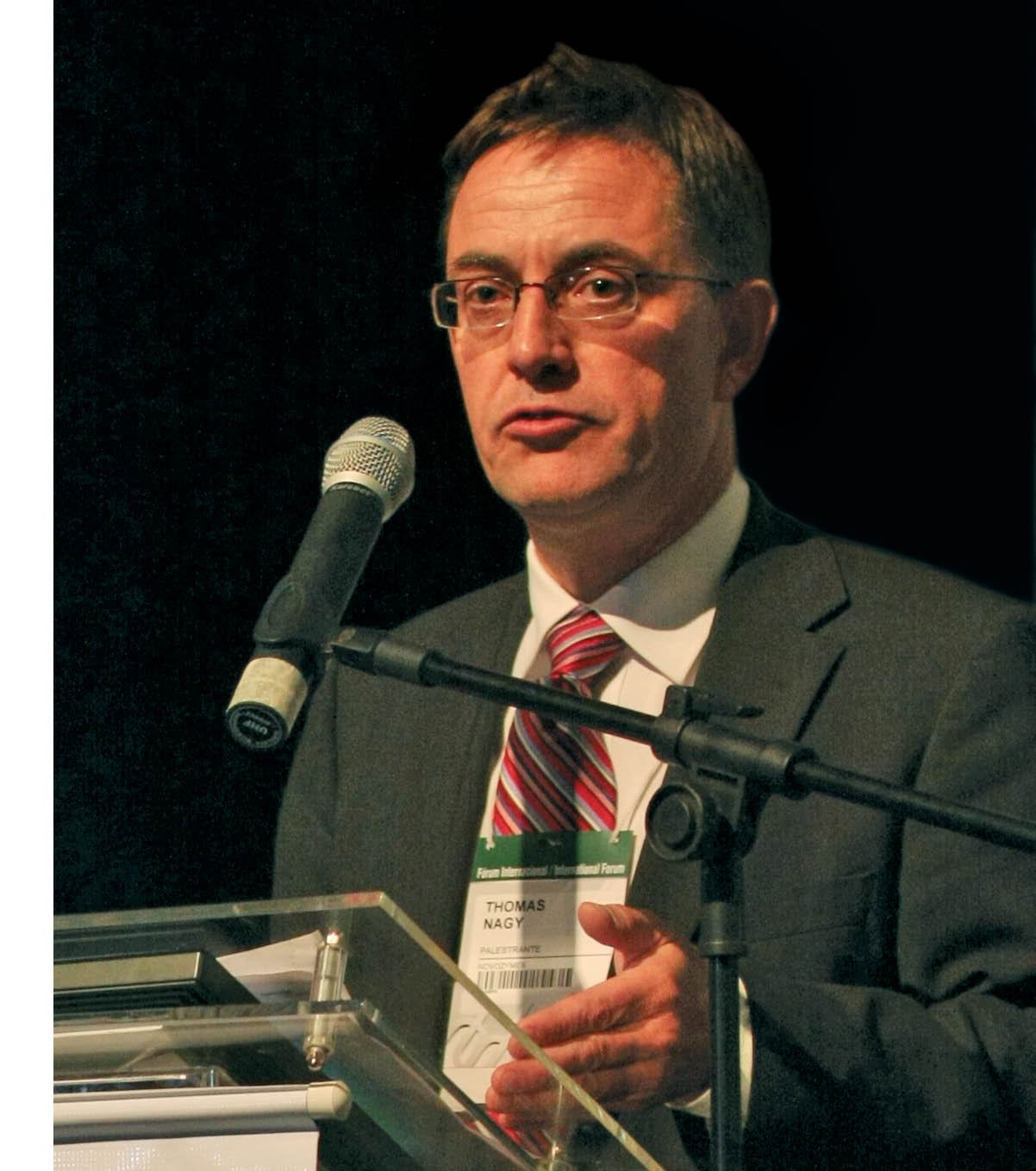Thomas Nagy
Worldwide Vice-president of Novozymes
Op-AA-26
One must work in partnership
Novozymes is an enzyme company, the world leader in the field of biotechnology and microorganisms, with more than 700 products used in 130 countries and in over 30 different industries. We have a 47% share of the industrial enzyme market worldwide, with global sales in a magnitude of US$ 1.6 billion, operational margin of 20%, and 14% of sales revenues being invested in R&D.
We work on developing first and second generation biofuels in partnership with several companies, in different industries around the world, in countries like China, United States, Europe and Brazil. In the latter, we have four partnerships: with CTC, Dedini, Petrobras and Braskem. With the first three we develop research on cellulosic ethanol and with Braskem, on the production of plastics.
At the World Economic Forum one focused on projections of the ethanol volume to be consumed by 2030. The United States rank about in the middle, given that the country has clear rules for renewable fuels and a forecast of approximately 22 billion gallons, until 2022, with the expectation of growing even more. In Latin America there is also potential for growth, but some countries are well ahead.
 China, for instance, will already have concluded this entire process in the next two or three years, with biomass being part of the strategy, contributing to this field of knowledge. In Europe, when one talks of the second generation, everyone says “oh, great, this is the new technology of tomorrow, everyone knows that”. But we have to make it feasible now, so with that intent we this year launched an enzyme family in the United States (Cellic 2), to produce cellulosic ethanol at 25 cents a gallon.
China, for instance, will already have concluded this entire process in the next two or three years, with biomass being part of the strategy, contributing to this field of knowledge. In Europe, when one talks of the second generation, everyone says “oh, great, this is the new technology of tomorrow, everyone knows that”. But we have to make it feasible now, so with that intent we this year launched an enzyme family in the United States (Cellic 2), to produce cellulosic ethanol at 25 cents a gallon.
The trend is to reduce the price even more, to approximate it to that of the first generation. We must operate in a direct manner, both in the United States and Europe, in terms of costs, benefits and special advantages of cellulosic ethanol. We must bring down the cost of cellulosic ethanol to a commercially feasible level.
We must foster second generation biofuels, because this can boost the entire production chain. When one talks of ethanol, Brazil is ahead in terms of infrastructure and logistics, but when one talks about second generation technology development, I assume Brazil is still behind the United States and Europe relative to government support.
Denmark, for instance, launched second generation ethanol supported almost entirely by the government. In this respect, Brazil still lags behind. However, I must say, we are working very closely together with the CTC and other partners and I also know that there are big opportunities for Brazil to continue as the leader in ethanol in the future.
In 2009, we set up a partnership with Braskem to produce renewable plastic from sugarcane. The microorganisms used in the fermentation process are the same, so for us it is indifferent if the basis is sugar or sugar from biomass. The fact is that we are dealing with emerging and growth markets. So, again, what I want to do is convince them that there are many benefits, enormous and fantastic advantages and that the technology is already available.
This means we need not go back to the lab, reinvent the wheel, like we did 20 or 30 years ago. We can go forward into the future and onto a commercial scale. Why are we doing this? Why is it important to discuss this? What are the trends behind all these numbers and processes? The answer is: we must deal with climate change and sustainable agriculture, because there is going to be a large population growth in the world, to 9 billion people around 2050. So, there will be 50% more people than there are today.
Some countries will be richer, others poorer, and by 2050, this entire population will continue consuming a lot. We must go from the left side to the right side, to where there is sustainability, better harvests, using agriculture not as something isolated, but integrated into sustainable growth, and biomass is one of the best opportunities to balance growth and protect the environment, in terms of fossil fuels. Biomass is a major benefit on the sugarcane platform.
If one looks at most renewable sources, they all can be used to generate energy. If one buys a car or a truck, one needs liquid fuel and that is why we believe this is such a big market for liquid fuels. In 10 years we will see some rechargeable hybrids, and, in 2030, basically 20% of the fleet will have engines powered by liquid fuels. This is a US$ 1.5 billion market. I don’t know on what kind of roads we will drive in the future, but we will surely know what type of engines will be used and developed.
The trend is to increase the number of vehicles on the roads and that’s when renewable products will have to be sustainable. Let me conclude by saying that you play a very important leadership role not only in Latin America, but throughout the world, because you’ve been studying this subject for 30 years. Brazil is a leading country at events such as the COP-15 and everyone is eager to see your participation, to hear the ideas Brazil has, because it is a country that can influence trends and projections.
Let me say this: Brazil plays an important role with respect to sustainable transportation and it is the reference standard for all Latin American countries. It represents the model and the concept adopted in recent years that these countries will likely follow. Renewable fuels are already reality and we are working hard on corn in the United States. We intend doing much more, but this cannot happen in an isolated manner. We need political support here. We know that the oil companies are not simply going to lay back and wait for us to grow while they progressively decrease in size. That is why we must work together.




